
Young women leading innovative solutions to overcome child poverty.
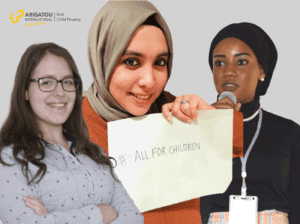
Every year, the world commemorates the International Women’s Day (March 8) to recognise the achievements and contribution of women towards creating a better world. Today, the world is faced with a multiplicity of crises, and this only calls for inclusive approaches towards addressing these crises, including child poverty.
Recognising the vital role they play in securing children’s wellbeing and dignity, we work with women leaders from diverse contexts towards creating a world free of child poverty. These women lead and promote innovative solutions aimed at addressing the root causes of child poverty.
In celebrating this year’s International Women’s Day, we cast a spotlight on three young women at the forefront of such innovative solutions to address child poverty.
Shazmin Rafeeq, I CAN Malaysia
Shazmin’s leadership: A community centre to serve children, particularly Rohingya children living as refugees in Kuala Lumpur, Malaysia.
I CAN Malaysia (founded by Shazmin) established a community learning center – the Darul eslah Academy – that provides basic nutrition, non-formal and social skills education to the children living as refugees, as well as volunteer opportunities for university students and other members of the community. Further, I CAN Malaysia, collaborates with several Madrassas to provide psycho-social support to the children, in addition to religious education and nurturing spirituality and positive values. Shazmin has been instrumental in leading these processes and working with other young people to act.
“We believe in the philosophy “Give a man a fish, and you feed him for a day; show him how to catch fish, and you feed him for a lifetime.” The focus of ICAN Malaysia is not only to help people living in or affected by poverty with their basic needs; but also to make them self-reliant by providing required training and guidance accordingly. Instead of considering poor people as burden or liability for the society, with our help, training, assistance and guidance each individual can start contributing to the society in every aspect.”
Zvonmira Jakić, GNRC (Global Network of Religions for Children) Bosnia and Herzegovina
Zvonmira’s leadership: Advocacy and social entrepreneurship.
Zvonimira Jakić is the youth coordinator for the Global Network of Religions for Children (GNRC) in Bosnia and Herzegovina and a youth advisor of the Presidency of Bosnia and Herzegovina, among other key leadership roles. Zvonmira is also a champion of promoting children’s education, forming a global program for tutoring for children in vulenrable circumstances. A receipient of the 2019 SEEBA “Best Young Entrepreneur” Award for the startup “Green Solutions” for innovation in agriculture digitalization, Zvonmira’s work epitomizes this year’s International Women’s Day theme, “DigitALL: Innovation and Technology for Gender Equality.”
“Changemaker (is) the word which explains me the best … I am mentoring several university and high school students around the globe (focusing) on Bosnia and Herzegovina, where I teach and mentor them to become future leaders and changemakers of the world. My motto for change and work is: “INSPIRE.ACT.CHANGE!” … My biggest success is when I see that one of my students made a positive CHANGE in the globe.”
*Zvonmira’s quote is from an interview with the European Democracy Youth Network (EYDN). Read Zvonmira’s full interview ‘Everyday Heros’ responses by the EYDN, here
Haoua Dicko, REJADH (Réseau des Enfants et Jeunes Africains pour les Droits Humains), Mali
Haoua’s leadership: Community mobilisation and youth-led advocacy for human rights and addressing gender-based violence (GBV)
Haoua has been part of the leadership of the REJADH network, spearheading grassroots advocacy work in Mali. REJADH (African Children and Youth Network for Human Rights/Réseau des Enfants et Jeunes Africains pour les Droits Humains) was established as a platform for advocacy by and for young people from 5 countries (Burundi, the Democratic Republic of Congo (DRC), Mali, South Sudan and Somalia) often affected by conflict, poverty, and Gender-Based Violence (GBV). Through this program, we sought to empower young leaders (youth, youth influencers, and young adults) with the necessary skills to help them reduce, prevent, and end gender-based violence and its negative effects on young people and the community at large. Since inception, REJADH has reached more than 5,000 children and youth through direct advocacy efforts. Similarly, its online reach has been overwhelming through the REJADH social media spaces.
“As a member of REJADH since its creation in October 2016 in Addis Ababa, Ethiopia, I can say that REJADH has had a very positive impact in my life, starting with this feeling of being useful in my community. I am now able to serve as a positive example and role model for other young Africans, and more particularly for my Malian brothers and sisters. I am committed to living with a lot of devotion and contribute more to the development of my continent. I believe this piece of wisdom, “the man who fights for others is better than the one who fights for himself”. The fight continues until it succeeds.
Happy International Women’s Day!
The post <strong>Young women leading innovative solutions to overcome child poverty.</strong> appeared first on End Child Poverty.
The post Young women leading innovative solutions to overcome child poverty. appeared first on Arigatou International.

Young women leading innovative solutions to overcome child poverty.

Every year, the world commemorates the International Women’s Day (March 8) to recognise the achievements and contribution of women towards creating a better world. Today, the world is faced with a multiplicity of crises, and this only calls for inclusive approaches towards addressing these crises, including child poverty.
Recognising the vital role they play in securing children’s wellbeing and dignity, we work with women leaders from diverse contexts towards creating a world free of child poverty. These women lead and promote innovative solutions aimed at addressing the root causes of child poverty.
In celebrating this year’s International Women’s Day, we cast a spotlight on three young women at the forefront of such innovative solutions to address child poverty.
Shazmin Rafeeq, I CAN Malaysia
Shazmin’s leadership: A community centre to serve children, particularly Rohingya children living as refugees in Kuala Lumpur, Malaysia.
I CAN Malaysia (founded by Shazmin) established a community learning center – the Darul eslah Academy – that provides basic nutrition, non-formal and social skills education to the children living as refugees, as well as volunteer opportunities for university students and other members of the community. Further, I CAN Malaysia, collaborates with several Madrassas to provide psycho-social support to the children, in addition to religious education and nurturing spirituality and positive values. Shazmin has been instrumental in leading these processes and working with other young people to act.
“We believe in the philosophy “Give a man a fish, and you feed him for a day; show him how to catch fish, and you feed him for a lifetime.” The focus of ICAN Malaysia is not only to help people living in or affected by poverty with their basic needs; but also to make them self-reliant by providing required training and guidance accordingly. Instead of considering poor people as burden or liability for the society, with our help, training, assistance and guidance each individual can start contributing to the society in every aspect.”
Zvonmira Jakić, GNRC (Global Network of Religions for Children) Bosnia and Herzegovina
Zvonmira’s leadership: Advocacy and social entrepreneurship.
Zvonimira Jakić is the youth coordinator for the Global Network of Religions for Children (GNRC) in Bosnia and Herzegovina and a youth advisor of the Presidency of Bosnia and Herzegovina, among other key leadership roles. Zvonmira is also a champion of promoting children’s education, forming a global program for tutoring for children in vulenrable circumstances. A receipient of the 2019 SEEBA “Best Young Entrepreneur” Award for the startup “Green Solutions” for innovation in agriculture digitalization, Zvonmira’s work epitomizes this year’s International Women’s Day theme, “DigitALL: Innovation and Technology for Gender Equality.”
“Changemaker (is) the word which explains me the best … I am mentoring several university and high school students around the globe (focusing) on Bosnia and Herzegovina, where I teach and mentor them to become future leaders and changemakers of the world. My motto for change and work is: “INSPIRE.ACT.CHANGE!” … My biggest success is when I see that one of my students made a positive CHANGE in the globe.”
*Zvonmira’s quote is from an interview with the European Democracy Youth Network (EYDN). Read Zvonmira’s full interview ‘Everyday Heros’ responses by the EYDN, here
Haoua Dicko, REJADH (Réseau des Enfants et Jeunes Africains pour les Droits Humains), Mali
Haoua’s leadership: Community mobilisation and youth-led advocacy for human rights and addressing gender-based violence (GBV)
Haoua has been part of the leadership of the REJADH network, spearheading grassroots advocacy work in Mali. REJADH (African Children and Youth Network for Human Rights/Réseau des Enfants et Jeunes Africains pour les Droits Humains) was established as a platform for advocacy by and for young people from 5 countries (Burundi, the Democratic Republic of Congo (DRC), Mali, South Sudan and Somalia) often affected by conflict, poverty, and Gender-Based Violence (GBV). Through this program, we sought to empower young leaders (youth, youth influencers, and young adults) with the necessary skills to help them reduce, prevent, and end gender-based violence and its negative effects on young people and the community at large. Since inception, REJADH has reached more than 5,000 children and youth through direct advocacy efforts. Similarly, its online reach has been overwhelming through the REJADH social media spaces.
“As a member of REJADH since its creation in October 2016 in Addis Ababa, Ethiopia, I can say that REJADH has had a very positive impact in my life, starting with this feeling of being useful in my community. I am now able to serve as a positive example and role model for other young Africans, and more particularly for my Malian brothers and sisters. I am committed to living with a lot of devotion and contribute more to the development of my continent. I believe this piece of wisdom, “the man who fights for others is better than the one who fights for himself”. The fight continues until it succeeds.
Happy International Women’s Day!
The post <strong>Young women leading innovative solutions to overcome child poverty.</strong> appeared first on End Child Poverty.
The post Young women leading innovative solutions to overcome child poverty. appeared first on Arigatou International.

Celebrating Mama Shamsa on International Women’s Day
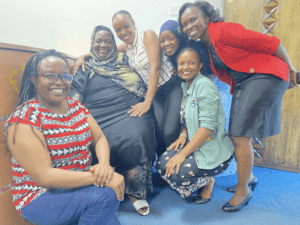
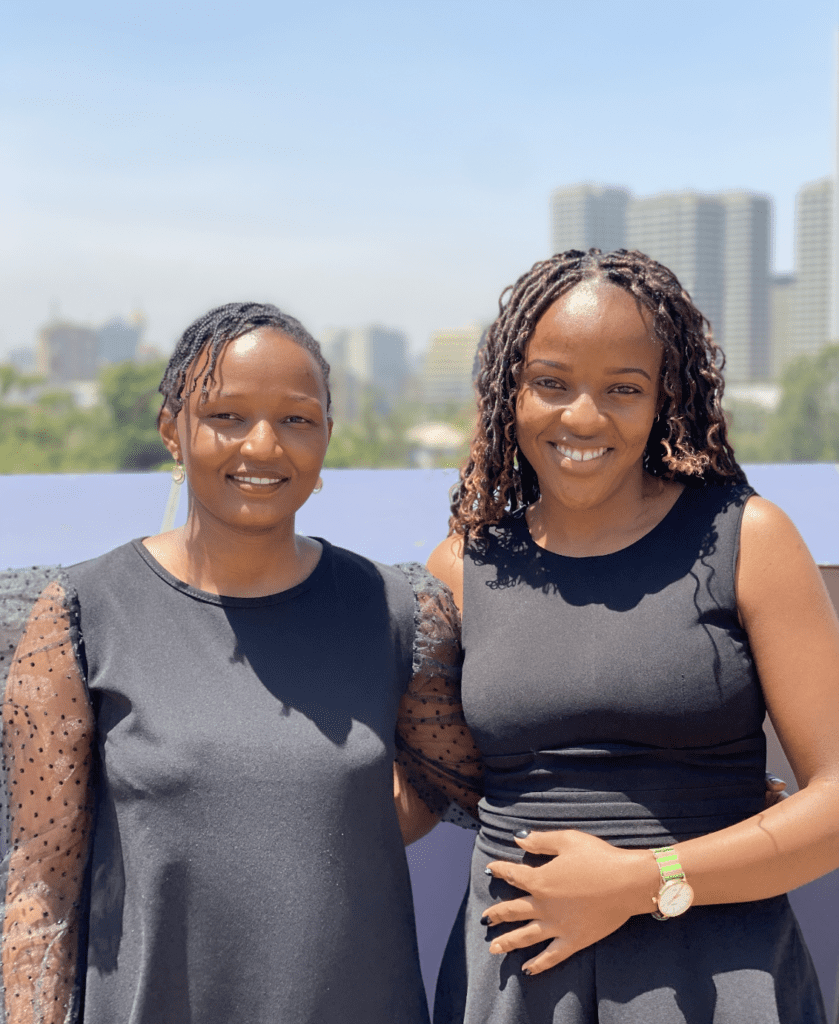
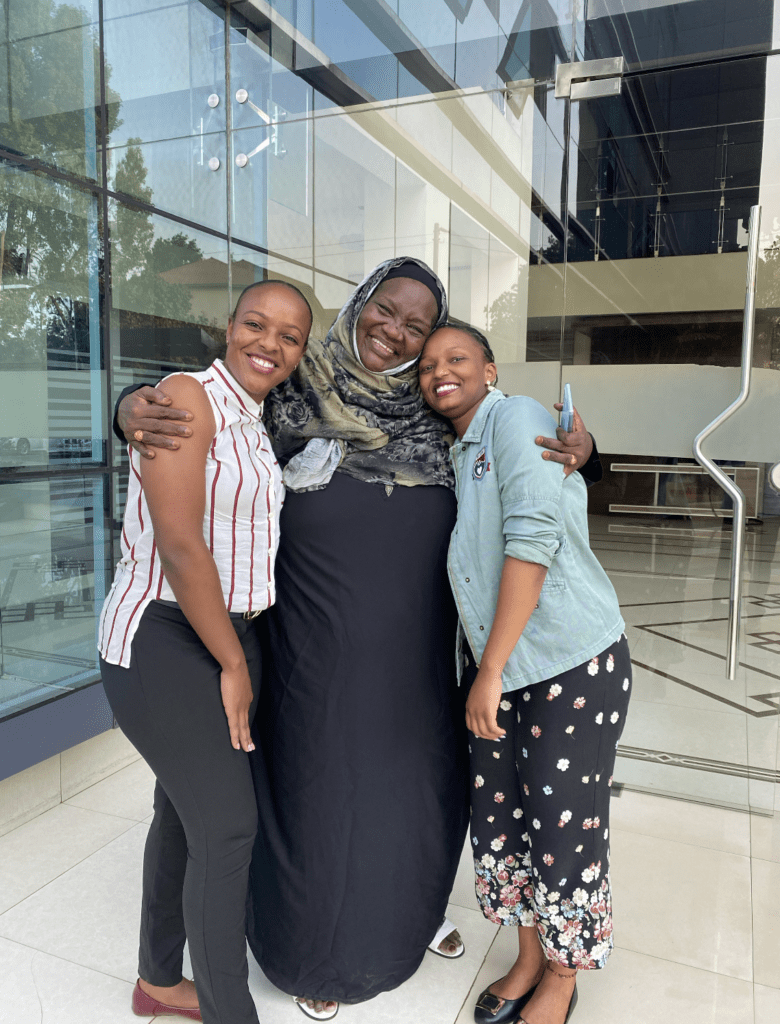
“If we have no peace, it is because we have forgotten that we belong to each other.”
— Mother Teresa
We had the privilege of meeting Ms. Shamsa Abubakar Fadhil, a Kenyan peace mediator, community mobilizer, and winner of the Zayed Award for Human Fraternity 2023. Popularly known as Mama Shamsa, she joined GNRC through a programme funded by Global Community Engagement and Resilience Fund (GCERF), aimed at empowering vulnerable women in Kisauni, Mombasa. Mama Shamsa facilitated children’s forums held in places of worship, the most common being Elim Church Nyali led by Rev. Maria Menego, a member of GNRC Kenya, and secretary of the GNRC Kenya committee.
The news of her visit to Arigatou International – Nairobi office was received with great excitement. As soon as she arrived, she got to know everyone, and her laughter warmed the room.
Mama is a great storyteller! The same warmth that her laughter carried, is the same warmth that our hearts were filled with as she shared the humble story of her work. Her effort in countering violent extremism is inspiring. To her, a little goes a long way. “Anyone aligned to humanitarian work should do it with an open heart, expecting nothing in return” Mama Shamsa.
The issue of violent extremism is not abstract. It has been on the rise in East Africa in recent years, causing anxiety among peacebuilding communities. Due to a lack of dedicated tools, The Goldin Institute, Chicago, and Arigatou International – Nairobi supported the development of the Community Resilience Against Violent Extremism (CRAVE) Resource Guide to fill that gap. Preceding the CRAVE Resource Guide, was the Building Resilience Against Violent Extremism (BRAVE) Training Manual and Resource Guide, by the Center for Sustainable Conflict Resolution (CSCR), aimed at addressing the rising radicalization and violent extremism, focusing on violent manifestations in Kenya.
“The process of rehabilitating those who have fallen victim to violent extremism is not easy – it is a long and slow process” Mama Shamsa stated. She explained the importance of demystifying narratives used by violent extremists to radicalize the youths, empowering, and encouraging them to find easy and sustainable means to fend for themselves.
According to Mama, the issue of violent extremism is a thorn in Mombasa. She explained that the leading causes of radicalization and violent extremism in Mombasa were a lack of education, a breakdown of the nuclear family unit, misguided ideologies, and religious differences that many religious leaders refrain from addressing.
“I am happy to have met the Arigatou International – Nairobi team, I feel very welcome and at home here,” she said as she departed.
We were all left inspired and motivated.
Oh! You might wonder why we refer to her as Mama, well… before she left, she warmly said “I now have additional children at Arigatou International and you are welcome to call me Mama.”
“Be selfless. You end up getting more than you anticipate when your soul is giving.”
Thank you MAMA, we celebrate you.
Signed off,
GNRC Communications,
Stacy Ndungu and Tracy Memusi
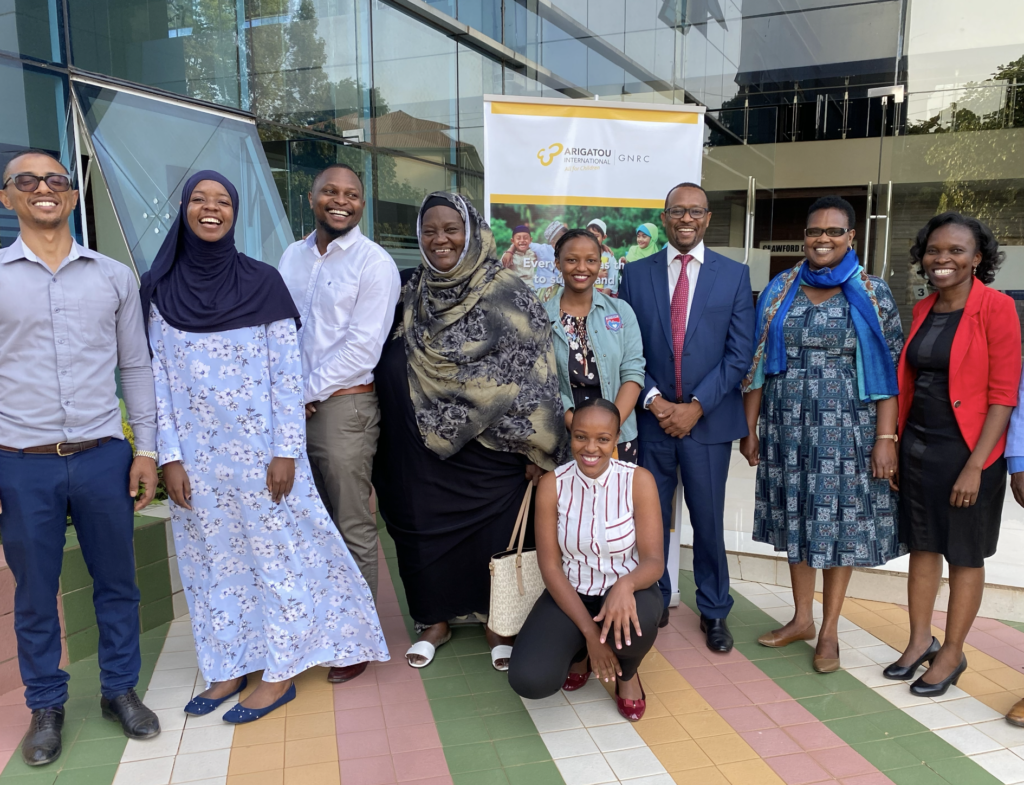
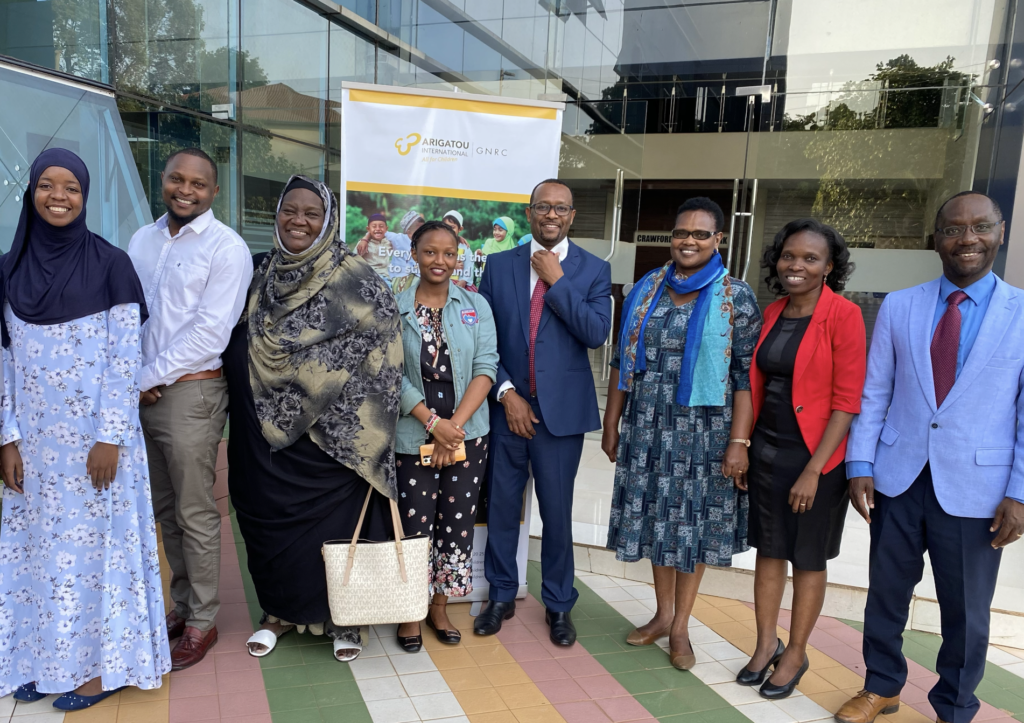

Children Gangs in Kenya: A Faith Leaders Perspective
“In my community, there are about ten known gangs that have recruited children and youth. They get attracted to gangs because of different factors within their environment. Through the GNRC, I have learned a lot. I now recognize the challenges of children in society and embrace them without judging or condemning them. Faith leaders should connect with their communities and educate them on the importance of maintaining spiritual resilience to overcome these challenges.”
– Rev Maria Kipruto,
GNRC Kenya
The post Celebrating Mama Shamsa on International Women’s Day appeared first on Global Network of Religions for Children.
The post Celebrating Mama Shamsa on International Women’s Day appeared first on Arigatou International.

Celebrating Mama Shamsa on International Women’s Day



“If we have no peace, it is because we have forgotten that we belong to each other.”
— Mother Teresa
We had the privilege of meeting Ms. Shamsa Abubakar Fadhil, a Kenyan peace mediator, community mobilizer, and winner of the Zayed Award for Human Fraternity 2023. Popularly known as Mama Shamsa, she joined GNRC through a programme funded by Global Community Engagement and Resilience Fund (GCERF), aimed at empowering vulnerable women in Kisauni, Mombasa. Mama Shamsa facilitated children’s forums held in places of worship, the most common being Elim Church Nyali led by Rev. Maria Menego, a member of GNRC Kenya, and secretary of the GNRC Kenya committee.
The news of her visit to Arigatou International – Nairobi office was received with great excitement. As soon as she arrived, she got to know everyone, and her laughter warmed the room.
Mama is a great storyteller! The same warmth that her laughter carried, is the same warmth that our hearts were filled with as she shared the humble story of her work. Her effort in countering violent extremism is inspiring. To her, a little goes a long way. “Anyone aligned to humanitarian work should do it with an open heart, expecting nothing in return” Mama Shamsa.
The issue of violent extremism is not abstract. It has been on the rise in East Africa in recent years, causing anxiety among peacebuilding communities. Due to a lack of dedicated tools, The Goldin Institute, Chicago, and Arigatou International – Nairobi supported the development of the Community Resilience Against Violent Extremism (CRAVE) Resource Guide to fill that gap. Preceding the CRAVE Resource Guide, was the Building Resilience Against Violent Extremism (BRAVE) Training Manual and Resource Guide, by the Center for Sustainable Conflict Resolution (CSCR), aimed at addressing the rising radicalization and violent extremism, focusing on violent manifestations in Kenya.
“The process of rehabilitating those who have fallen victim to violent extremism is not easy – it is a long and slow process” Mama Shamsa stated. She explained the importance of demystifying narratives used by violent extremists to radicalize the youths, empowering, and encouraging them to find easy and sustainable means to fend for themselves.
According to Mama, the issue of violent extremism is a thorn in Mombasa. She explained that the leading causes of radicalization and violent extremism in Mombasa were a lack of education, a breakdown of the nuclear family unit, misguided ideologies, and religious differences that many religious leaders refrain from addressing.
“I am happy to have met the Arigatou International – Nairobi team, I feel very welcome and at home here,” she said as she departed.
We were all left inspired and motivated.
Oh! You might wonder why we refer to her as Mama, well… before she left, she warmly said “I now have additional children at Arigatou International and you are welcome to call me Mama.”
“Be selfless. You end up getting more than you anticipate when your soul is giving.”
Thank you MAMA, we celebrate you.
Signed off,
GNRC Communications,
Stacy Ndungu and Tracy Memusi



Children Gangs in Kenya: A Faith Leaders Perspective
“In my community, there are about ten known gangs that have recruited children and youth. They get attracted to gangs because of different factors within their environment. Through the GNRC, I have learned a lot. I now recognize the challenges of children in society and embrace them without judging or condemning them. Faith leaders should connect with their communities and educate them on the importance of maintaining spiritual resilience to overcome these challenges.”
– Rev Maria Kipruto,
GNRC Kenya
The post Celebrating Mama Shamsa on International Women’s Day appeared first on Global Network of Religions for Children.
The post Celebrating Mama Shamsa on International Women’s Day appeared first on Arigatou International.

Improve Your Poker Skills and Become a Confident Person
Poker is a great way to pass the time, and it can be a lucrative way to make some money. But did you know that it also carries a lot of mental benefits? In fact, it can help you improve your cognitive skills and become a more confident person overall.
The game involves a series of betting rounds that start when everyone is dealt their cards. After that, players can choose to ‘raise’ or ‘fold’ if they are not happy with their hand.
To be able to make the right call in poker, you need to understand the odds and probabilities of your opponent’s hand. This is an important skill for you to develop, and it’s something that will be invaluable in your life.
Another thing that you’ll need to learn is how to read other people. This is an essential skill to have when playing poker, as you’ll need to be able to spot when your opponents are acting shifty or nervous. It can be difficult to tell whether they are behaving this way because they’re having a bad day or just unsure of how the game is going.
Luckily, there are a lot of resources out there that will help you develop this critical skill. These can range from online training videos to even live coaching sessions.
You can also join a poker forum to meet other people who share your passion for the game. These can be a great place to discuss and learn more about the game, while gaining some valuable poker tips along the way.
One of the best things you can do to improve your poker skills is to play a lot of hands. This will help you learn a lot and get better at the game quickly. However, it’s important to remember that playing a lot of hands isn’t enough if you want to become an expert in the game.
The other thing that you should do is to focus on improving your overall poker strategy. This can include learning the different variations of the game, understanding how to play against different types of opponents, and knowing when to fold and when to raise.
Once you’ve mastered these skills, you can then move on to the more advanced strategies that will allow you to become an expert at the game. It is a good idea to keep practicing this skill until you feel confident in your ability to make the correct call at the table.
In the long run, these poker tips will pay off big time for you. Not only will you be a much more confident player at the table, but you’ll also be able to win a lot of money.
As you can see, poker is an incredibly complex and rewarding game. It’s important to keep in mind that it takes a lot of skill and dedication to become a good poker player. It’s easy to become discouraged if you don’t start seeing immediate results, but the key is to never give up.
The post Improve Your Poker Skills and Become a Confident Person appeared first on www.snvla.org.






